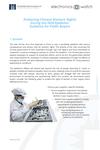Covid-19 Updates from Workers and Monitoring Partners
Malaysia
In April 2020, an ex-electronics factory worker explained the impact the pandemic was having on migrant workers in Malaysia (see video below). One year on, the situation has only worsened.
Read the update from monitoring partner Tenaganita, April 2021
(EXTRACT) "Migrant workers have been labelled as spreaders of the disease... Refugees and migrant workers who are found guilty of any offence, including Covid related offences, face a double jeopardy. They have to serve a prison sentence, after which their work permit is revoked and they are held in immigration detention centres to be deported."
Philippines
Update from Monitoring Partner Center for Trade Union and Human Rights (CTUHR) - April, 2021
(EXTRACT) "Attacks against unionists, activists and critics have escalated during the pandemic.[...] Some of the workers/trade unionists arrested were CTUHR’s partners and sources of information on the ground."
 Dandy Miguel after he was shot 8 times on his way home from work in Laguna, Philippines.
Dandy Miguel after he was shot 8 times on his way home from work in Laguna, Philippines.
Poland
Joanna Szymonek, Polish Institute for Human Rights and Business (PIHRB).
(EXTRACT) "Important is the fact that in all cases the solutions introduced by the company have been consulted with trade unions and in the case of company affected by COVID-19 crisis an official agreement was concluded for a period of 3 months and seems to balance economic and social interests."
Indonesia
Alfian Al-Ayubby Pelu, LIPS (Sedane Labour Resource Center)
(EXTRACT) “Some factories have been closed down, such as in Batam, one of the important electronics production hubs where 13,000 workers have been laid off. Many of these workers didn’t receive the severance pay as mandated by law. (…) Some other factories continue to operate such as in West Java province, (…) however in these factories, Covid prevention mechanisms are mostly ignored (…) A facial mask is only provided every month. (…) The working conditions are worse than before, management have failed to set a regulation to adjust to this pandemic.”
Czech Republic
Excerpts from an interview with a worker from electronics factory in Czech Republic
(EXTRACT) "The truth is that people go to work scared, because spending 11 hours with a couple of hundred other people in the hall, or even a few dozen people in the same manufacturing process that build up is a very different level of risk than 5 or 10 minutes. (...) I don't remember ever going to work thinking that I may not be there in two weeks' time. That's new for most people, I guess."
India
Aneesh Manjunath, Cividep India
(EXTRACT) "Another alarming development in the past few weeks has been the move to suspend various labour laws by several state governments including Uttar Pradesh, Madhya Pradesh and Gujarat, among others. This has been justified as necessary to revive industrial activity and attract more foreign investment. (...) If implemented, the changes would also allow for higher labour flexibility and a hire-and-fire policy to be adopted, along with increased working hours and overtime, third-party inspections, and simplified registration and license procedures. More significantly, existing judicial mechanisms will be rendered effectively redundant from the perspective of labour-related disputes. In the absence of essential labour laws that were already otherwise poorly implemented, workers will simply be left with no legal avenue to avail entitlements or bring up employment-related grievances."
Vietnam
Migrant electronics worker
(EXTRACT) "Enterprises can neither export their goods nor import raw materials for production because most materials for producing electronic components are made in China (...) so they cut off about 30-50% of orders. Therefore the workers' income falls sharply, about 50-60% of income. (...) Maintaining normal life at this time is impossible because food prices rise so high.(...) Electronics enterprises' partners need to consider the effects on workers in the whole supply chain to ensure not to cancel or suddenly reduce orders and also need to care for employees working in production facilities."
China
Guidance for public buyers to help protect the rights of workers in their supply chains affected by the epidemic.
Useful Links
- Impacts of COVID-19 on supply chain workers in the electronics sector - Updates from Business & Human Rights Resource Centre
- Responsible disengagement in the time of corona - SOMO, ECCHR and PAX position paper, (20 April, 2020)
- IndustriALL Global Union's publication on the right to refuse or to shut down unsafe work (8 April, 2020)
- Covid-19 - Advice for workers and employers, IndustriALL Global Union (30 March, 2020)
- Union responses to the novel coronavirus
- Information from ITUC affiliates, Global Union Federations and LabourStart about the COVID-19 coronavirus pandemic
- China’s trade unions caught in the headlights of the coronavirus crisis, China Labour Bulletin (1 April, 2020)
- Don't forget the people behind the PPE – migrant workers meeting the surge in demand for medical gloves, The Telegraph (17 April, 2020)


